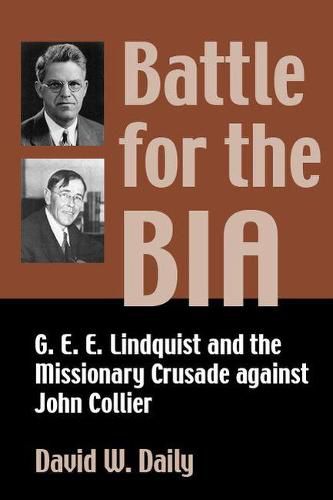Readings Newsletter
Become a Readings Member to make your shopping experience even easier.
Sign in or sign up for free!
You’re not far away from qualifying for FREE standard shipping within Australia
You’ve qualified for FREE standard shipping within Australia
The cart is loading…






By the end of the nineteenth century, Protestant leaders and the Bureau of Indian Affairs had formed a long-standing partnership in the effort to assimilate Indians into American society. But beginning in the 1920s, John Collier emerged as part of a rising group of activists who celebrated Indian cultures and challenged assimilation policies. As commissioner of Indian affairs for twelve years, he pushed legislation to preserve tribal sovereignty, creating a crisis for Protestant reformers and their sense of custodial authority over Indians.
Although historians have viewed missionary opponents of Collier as faceless adversaries, one of their leading advocates was Gustavus Elmer Emmanuel Lindquist, a representative of the Home Missions Council of the Federal Council of Churches. An itinerant field agent and lobbyist, Lindquist was in contact with reformers, philanthropists, government officials, other missionaries, and leaders in practically every Indian community across the country, and he brought every ounce of his influence to bear in a full-fledged assault on Collier’s reforms. David Daily paints a compelling picture of Lindquist’s crusade-a struggle bristling with personal animosity, political calculation, and religious zeal-as he promoted Native Christian leadership and sought to preserve Protestant influence in Indian affairs. In the first book to address this opposition to Collier’s reforms, he tells how Lindquist appropriated the arguments of the radical assimilationists whom he had long opposed to call for the dismantling of the BIA and all the forms of race-based treatment that he believed were associated with it.
Daily traces the shifts in Lindquist’s thought regarding the assimilation question over the course of half a century, and in revealing the efforts of this one individual he sheds new light on the whole assimilation controversy. He explicates the role that Christian Indian leaders played in both fostering and resisting the changes that Lindquist advocated, and he shows how Protestant leaders held on to authority in Indian affairs during Collier’s tenure as commissioner. This survey of Lindquist’s career raises important issues regarding tribal rights and the place of Native peoples in American society. It offers new insights into the domestic colonialism practiced by the United States as it tells of one of the great untold battles in the history of Indian affairs.
$9.00 standard shipping within Australia
FREE standard shipping within Australia for orders over $100.00
Express & International shipping calculated at checkout
By the end of the nineteenth century, Protestant leaders and the Bureau of Indian Affairs had formed a long-standing partnership in the effort to assimilate Indians into American society. But beginning in the 1920s, John Collier emerged as part of a rising group of activists who celebrated Indian cultures and challenged assimilation policies. As commissioner of Indian affairs for twelve years, he pushed legislation to preserve tribal sovereignty, creating a crisis for Protestant reformers and their sense of custodial authority over Indians.
Although historians have viewed missionary opponents of Collier as faceless adversaries, one of their leading advocates was Gustavus Elmer Emmanuel Lindquist, a representative of the Home Missions Council of the Federal Council of Churches. An itinerant field agent and lobbyist, Lindquist was in contact with reformers, philanthropists, government officials, other missionaries, and leaders in practically every Indian community across the country, and he brought every ounce of his influence to bear in a full-fledged assault on Collier’s reforms. David Daily paints a compelling picture of Lindquist’s crusade-a struggle bristling with personal animosity, political calculation, and religious zeal-as he promoted Native Christian leadership and sought to preserve Protestant influence in Indian affairs. In the first book to address this opposition to Collier’s reforms, he tells how Lindquist appropriated the arguments of the radical assimilationists whom he had long opposed to call for the dismantling of the BIA and all the forms of race-based treatment that he believed were associated with it.
Daily traces the shifts in Lindquist’s thought regarding the assimilation question over the course of half a century, and in revealing the efforts of this one individual he sheds new light on the whole assimilation controversy. He explicates the role that Christian Indian leaders played in both fostering and resisting the changes that Lindquist advocated, and he shows how Protestant leaders held on to authority in Indian affairs during Collier’s tenure as commissioner. This survey of Lindquist’s career raises important issues regarding tribal rights and the place of Native peoples in American society. It offers new insights into the domestic colonialism practiced by the United States as it tells of one of the great untold battles in the history of Indian affairs.